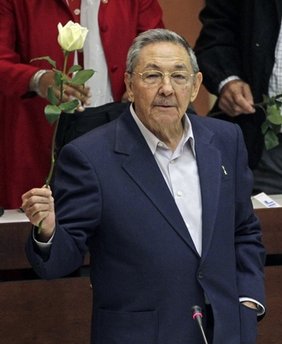
I don’t know if everyone who chanced to hear or read Raul Castro’s latest speech felt as I did, shocked and somewhat confused. I didn’t know if I was hearing a man who is really a reformist, or if it was just more of the same. Perhaps it was all about my desire to hear the word change.
On a first read through, I discovered a man who talked of an inclusive future, “We will proceed, make, grow, continue…” he said. Who confessed to being a fighter against the State secrecy. He even quoted Bible verses, “Thou shalt not bear false witness,” and Incan ethical principles, “Do not lie, steal, be lazy.”
The President of the Council of State spoke of equality of all before the law and the responsibility of those who commit “a crime in Cuba without regard to position. Whomever it may be,” he said, “will have to face the consequences of their mistakes and the weight of justice.” He, however, feels he has the right to correct (or not) with impunity the mistakes committed over five decades of the construction of socialism.
The younger Castro brother said he will put an end to failures and excesses. The historic leader will not tolerate justifications, inaccuracies or lies from officials at any level. “The compañeros who give false information will be permanently removed and even tossed out of the Party if they are active in it,” he said.
As an example he offered the dismissals of Jorge Luis Sierra Cruz, Yadira García Vera and Pedro Sáez Montejo who held important posts in the leadership of the Party and the Government, “for assuming powers that did not belong to them and that led to serious errors in leadership.”
I would be interesting to know what he himself was doing when these events occurred, as Second Secretary of the Cuban Communist Party and as head of State and of the Government. Maybe it was his own, evaded, fault for not putting these officials before the courts.
The historic leader recognized that freedom to criticize is a right that cannot be denied anyone, but Gag Law 88/99 remains in effect, and severely penalizes the exercise of free speech.
He spoke of open discussions, debates freed from dogma and unworkable schemes, of not excluding divergent views, but conditioned everything to a specific scenario. He will accept differences of opinion, provided they are — “preferably” — expressed at the opportune time, in the correct way, and at the proper place.
He also recognized that the State does not have role in relationships between private individuals, but it does decide what can be bought and sold in society. He affirmed that self-employment will free people to carry out activities relating to the supply of goods and services, but he did not relinquish control over them. And it is the government that decides what and how this sector should operate, and in what way and under what organizational methods it will function.
Raul Castro’s speech seemed to me to be about reform, and at the same time chameleonic and surrealistic. On reading his words a second time, my confusion disappeared, as did my hopes for change. As my analysis progressed and deepened, my subconscious got stuck on an old saying: “Fool me once…”
This article originally appeared in Diaro de Cuba.
January 3, 2011
